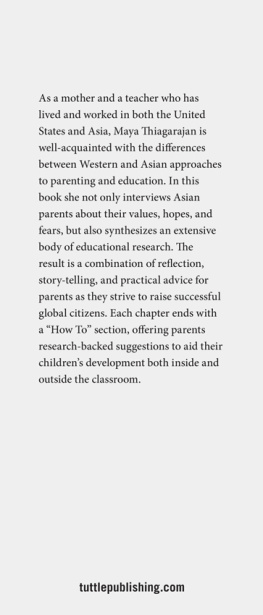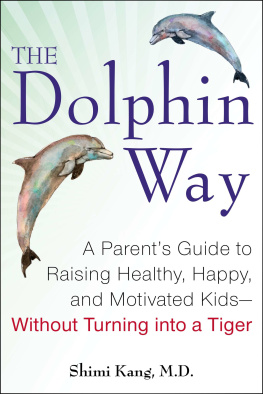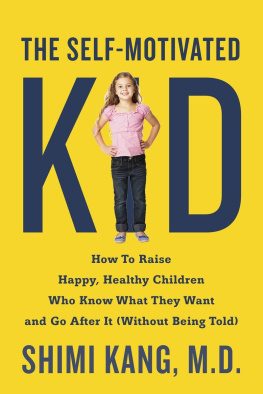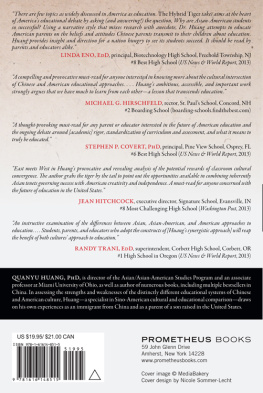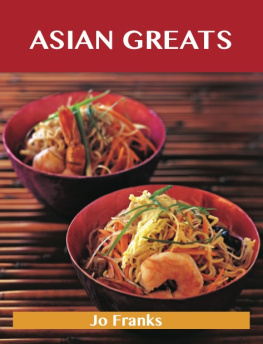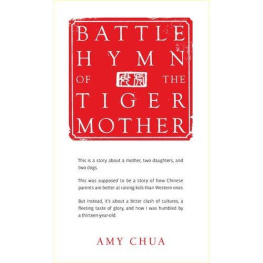ACKNOWLEDGEMENTS AND THANKS
Firstly, I would like to thank all the parents, students, and educators who shared valuable insights with me, both formally and informally over the last five years. To all the mothersthank you so much. Without your stories, this book wouldnt exist.
In particular, a very special thank-you to the following people for their valuable contributions, help and support.
Nayantara Srinivasan
Daphne Lee
Wendy Kang
Gillian Heng
Sara Tan
Joanne Li
Wu Guang Li
Qing Liu
Alpa Raiyani
Kamaljeet Hayer
Mathangi Venkatesh Babu
Sonali Sethi Jain
Mrs. Sengupta
Gunjali Singh
Vrishali Shekar
Sraboney Ghose
Melinda Foong
Norrida Bte Mohd Salleh
Siti Maslinda Binte Mohd Sallim
Eileen Kang
Shane Kwek (Innova Junior College)
Dr. Jason Tan (National Institute of Education, Singapore)
Dr. Gavin Jones (National University of Singapore)
Dr. Kirpal Singh (Singapore Management University)
Clarinda Choh (Head of GEP, Hwa Chong Institution)
I would also like to thank my fantastic agent, Helen Mangham, for being such a solid source of support through the entire process. Additionally, Jayapriya Vasudevan also provided encouragement and advice along the way.
To my editor, Cathy Layne, a big thank-you for your deep investment in my book and for all the constructive feedback. Also, I would like to thank the entire team at Tuttle for believing in my book.
Over the last year, I have received huge amounts of feedback from a number of friends and colleagues. Specifically, I would like to thank Nadine Bailey, Carol Lam, Kate Levy, and Chris and Shasta Huntington for taking the time to read parts of my manuscript and offer feedback. Also, thank you to Sandhya and Shaan, my close friends from Chennai, for encouragement along the way.
I would also like to thank all my studentspast, present, and futurefor enriching my life so much. A very special shout out to the many students who shared their stories with me. Thanks to Ashley, Ada, Fiona, Amanda, Vanessa, Minjin, and all the other kids who made this book possible.
I would like to thank my family. My father, the late Raj Thiagarajan, and my mother, Debbie Thiagarajan, have also always been a source of intellectual and creative inspiration. My sisters, Tara and Rena, have always been my closest friends. I am eternally grateful for all the love, support, and guidance that my parents and sisters have given me.
To my dear husband, Ritwik, thank you for supporting me through this process in so many ways: from offering me emotional support to reading my manuscript and offering me constructive feedback.
And most importantly, to Lekha and Rishi, my darling children, a big hug for bringing so much love and laughter into my life and a big thank-you for inspiring me to write this book.
BIBLIOGRAPHY
CHAPTER 1
WHY ARE ALL THE ASIAN KIDS ON THE MATH TEAM?
Books:
Boaler, Jo. Whats Math Got To Do With It? New York: Viking Penguin, 2008.
Dehaene, Stanislas. The Number Sense: How the Mind Creates Mathematics . New York: Oxford University Press, 2011.
Eliot, Lise. Pink Brain, Blue Brain: How Small Differences Grow into Troublesome Gapsand What We Can Do About It. New York: Houghton Mifflin Harcourt, 2009.
Gladwell, Malcom. Outliers: The Story of Success . New York: Little, Brown and Company, 2008.
Schank, Roger. Teaching Minds . New York: Columbia University Press, 2011.
Steele, Claude. Whistling Vivaldi: How Stereotypes Affect Us and What We Can Do . New York: W. W. Norton & Co., 2010.
Other sources:
Claessens, Amy, and Mimi Engel. How Important Is Where You Start? Early Mathematics Knowledge and Later School Success. Teachers College Record 115 (June 2013).
Intel Science Competition website: http://www.intel.com/content/www/us/en/education/competitions/science-talent-search.html.
Levine, Susan C., Linda Whealton Suriyakham, Meredith L. Rowe, Janellen Huttenlocher, and Elizabeth A. Gunderson. Developmental Psychology 46, no. 5, September 2010. doi: 10.1037/a0019671.
Li, Hao. Asian Americans Increasingly Defy STEM Stereotypes. International Business Times , August 6, 2010. http://www.ibtimes.com/asian-americans-increasingly-defying-stem-stereotype-246578.
Math Counts website: http://mathcounts.org/.
Ma, Ying Yi. Model Minority, Model for Whom? An Investigation of Asian-American Students in Science and Engineering. AAPI Nexus: Aisian Americans & Pacific Islanders Policy, Practice, and Community , UCLA Asian American Studies Center, September 19, 2011.
Qiang, Gu Yong. In China, Higher Education Brings Few Guarantees. Time , July 14, 2013.
CHAPTER 2
RAISING READERSIS WEST REALLY BEST?
Books:
Hart, Betty, and Todd R. Risley. Meaningful Differences in the Everyday Experience of Young American Children. Baltimore, MD: Paul H. Brookes, 1995.
Kittle, Penny. Book Love: Developing Depth, Stamina, and Passion in Adolescent Readers . Portsmouth, NH: Heinemann, 2013.
Krashen, Stephen D. The Power of Reading: Insights from the Research . Portsmouth, NH: Heinemann, 2004.
Wolf, Maryanne. Proust and the Squid: The Story and Science of the Reading Brain , New York: HarperCollins, 2007.
Other sources:
The Annie E. Casey Foundation. Early Warning Confirmed: A Research Update on Third-grade Reading. Baltimore: The Annie E. Casey Foundation, 2013. http://www.aecf.org/resources/early-warning-confirmed/.
Anderson, Richard C. and William Nagy, The Vocabulary Conundrum, in The Professional Journal of the American Federation of Teachers 16, no. 4 (1992).
Cunningham, Anne. E., and Keith E. Stanovich. Early Reading Acquisition and Its Relation to Reading Experience and Ability 10 Years Later. Developmental Psychology 33 no. 6 (November 1997): 4945.
Kidd, David Comer, and Emanuele Castano. Reading Literary Fiction Improves Theory of Mind. Science 342 (October 2013): 377380.
Kim, James S. Summer Reading and the Ethnic Achievement Gap. Paper presented at the American Educational Research Association, Chicago, April 21, 2003.
Kim, James S. Research and the Reading Wars. In When Research Matters , edited by Fredrick M. Hess, 89111. Cambridge, MA: Harvard University Press, 2008.
Krashen, Stephen. We Acquire Vocabulary and Spelling by Reading: Additional Evidence for the Input Hypothesis. Modern Language Journal 73 (1989): 440464.
Krashen, Stephen. School Libraries, Public Libraries, and the NAEP Reading Scores. School Library Media Quarterly 23 (1995): 235238. McQuillan, Jeff, and Victoria Rodrigo. Literature-Based Programs for First Language Development: Giving Native Bilinguals Access to Books. In Literacy, Access, and Libraries among the Language Minority Population , edited by Rebecca Constantino. Lanham, MD: Scarecrow, 1998.
Nagy, William, Richard Anderson, and Patricia Herman. Learning Word Meanings from Context during Normal Reading. American Educational Research Journal 24 (1987): 237270.
Paul, Annie Murphy. Why Third Grade is So Important: The Matthew Effect. Ideas ( Time magazines blog), September 26, 2012. http:///ideas.time.com/2012/09/26/why-third-grade-is-so-important-the-matthew-effect/.
Ramos, Francisco, and Stephen Krashen. (1998) The Impact of One Trip to the Public Library: Making Books Available May Be the Best Incentive for Reading. The Reading Teacher 51, no. 7 (April 1998): 614 - 615
Shu, Hua, Richard C. Anderson, and Houcan Zhang. Incidental learning of word meanings while reading: A Chinese and American cross-cultural study. Reading Research Quarterly 30, no. 1 (1995), 7695.
Stanovich, Keith E., Richard F. West, and Michele R. Harrison. Knowledge growth and maintenance across the lifespan: The role of print exposure. Developmental Psychology 31, no. 5 (September 1995): 811826.

